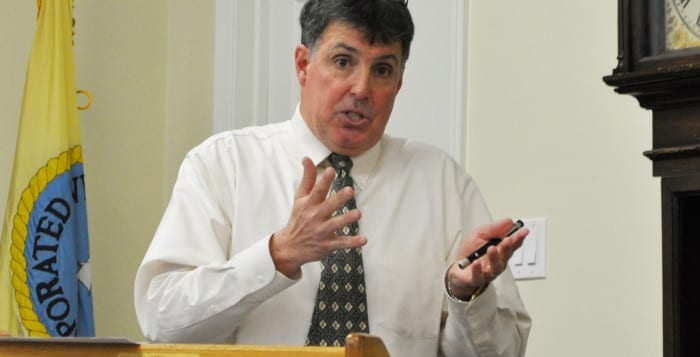The weather isn’t the only thing warming up.
With eight people interested in two seats on the Democratic-controlled Huntington Town Board, local party leaders will soon have to roll up their sleeves to choose their picks for the slots.
On the Democratic side, incumbent Councilwoman Susan Berland (D) will seek a fifth term in office. Afghanistan war veteran and Northport-East Northport school district teacher Darryl St. George, of Centerport tossed his hat into the ring earlier this year. Huntington Business Improvement District President Keith Barrett, of Melville, is taking a second stab at nomination after screening for Town Board in 2013. And political science adjunct professor Jim Kelly, of Huntington, who is a retired Nassau County Police Department EMS supervisor, also plans on screening.
The Democrats are screening candidates next week, according to Huntington Town Democratic Committee Chairwoman Mary Collins.
Republicans have already screened Jim Leonick, an East Northport attorney, Janet Heller-Smitelli, a Huntington attorney and Jennifer Thompson, a Northport resident and member of the Northport-East Northport school board. They’ll also screen Independence Party member and incumbent Councilman Gene Cook (I), who said he’s seeking his final term.
The party plans to host another round of screenings tomorrow evening, Toni Tepe, Huntington Town Republican Committee chairwoman said, where she expects two more individuals to screen.
Election Day is Nov. 3.
Susan Berland
Berland, of Dix Hills, has been in office since 2001. During her time in office, she’s sponsored legislation regulating bamboo and blight in Huntington Town, and she spearheaded the effort to televise all official town meetings, according to her bio on the town’s website.
The councilwoman is a member of the Huntington Lighthouse Preservation Society, Kiwanis Club of Huntington and the Board of Directors of the International Dyslexia Association of Long Island.
This election is still important, despite the fact that the Democrats control four out of five seats on the board, Berland said.
“I think every election year is crucial. It takes the town in a specific direction. I want to keep it in a positive direction both, economically and realistically.”
Gene Cook
An Independence Party-member, Cook, 53, of Greenlawn, is seeking the nod for a second four-year term on the board. If elected, Cook said it would be his last term in office. He said he believes in term limits, and that board members shouldn’t serve more than two terms.
Asked why he’s running, Cook said he has taken issue with the way the Democratic majority has spent money. He said he’s proud of projects he’s been able to do at no cost to the taxpayer, like getting a group of businesses together to pave the parking lot of the VFW Post 1469 Nathan Hale in Huntington Station.
“I don’t want the children of the future to be paying for our mistakes and I believe that’s the way it’s going,” he said.
Darryl St. George
St. George, 32, a Democrat from Centerport, declared that he is running for the board earlier this year, and is open to waging a primary election if the party does not choose him. A local teacher and veteran, St. George, 32, served as a Navy corpsman with the U.S. Marines and is interested in tackling the “the scourge of addiction” on a townwide level, he said in an interview earlier this year. The cause is personal, as he lost his 21-year-old brother, Corey, to a drug overdose. The tragedy expedited his release from the Navy in 2012. St. George also teaches social studies at Northport High School.
“I think there’s a few reasons why I want to run,” he said in the earlier interview. “Service is a big part of it: My time in the Navy, my time as a teacher has taught me to value my service to the community.”
Jim Leonick
Leonick, 53 and a Republican, said he wants to run because he has an interest in the future of the town for his children and his neighbor’s children. Leonick is concerned about overdevelopment, transparency at town hall and is interested in exploring term limits for council people — “because I don’t think that it’s right for a number of reasons for anyone to be in a position for as long as some of the town council people have been in their offices.”
Leonick is an attorney with a practice Leonick Law, PLLC, located in East Northport. He’s been involved in a number of local organizations, including serving as a Boy Scout leader, a past president of the Rotary Club of East Northport and a past board member of the East Northport Chamber of Commerce, among others.
“I’ve been involved in a lot of different community things and now I think its time to run for office.”
Keith Barrett
This would be Barrett’s second stab at the nomination, after losing out to Councilwoman Tracey Edwards (D) in 2013. Barrett, 49, of Melville currently works at town hall as the deputy director of general services. He also owns Barrett Automotive in Huntington Station and is the leader of the Huntington Station Business Improvement District — a group he’s belonged to for 11 years — where he said he’s worked to unify the community and beautify the neighborhood.
At town hall, he said he’s learned a lot about budgets and has already made changes in the General Services Department that have saved taxpayers money. For example, he streamlined state inspections of town vehicles through investing in an inspection machine and getting employees certified in motor vehicle inspections. “I’m a business guy,” he said. “Running town hall is a business. I’d like to make it easier for the residents and businesses to be able to facilitate government.”
Janet L. Heller-Smitelli
Heller-Smitelli is a civil litigator who has lived in Huntington for more than 20 years. She screened with Republicans to run for either Suffolk County Legislature — the 17th Legislative District seat held by Lou D’Amaro (D-North Babylon) — or for Town Board. In a statement, she said she’s been active with the Boy Scouts and has served as an assistant scoutmaster.
Heller-Smitelli said she’s been a member of the Republican committee for 10 years. She said she’s running because she believes there needs to be a “fresh vision and renewed spirit” when it comes to the issue of development.
“I am interested in running for office in order to advance my belief that the Town of Huntington needs to be more selective in the development and use of vacant and available parcels of land. Too often we have seen the result of inappropriate and short-sighted projects that result in a drain of our resources and adversely affect our infrastructure.”
Jim Kelly
Kelly, 64, a Democrat, is a Huntington Station resident. He is a retired EMS supervisor with the Nassau County Police Department and is currently an adjunct professor of political science at St. Joseph’s College.
Kelly said he has experience in emergency management — at Nassau County’s Office of Emergency Management, he served as bioterrorism coordinator, where he learned the ins and outs of being prepared for acts of terrorism and natural disasters.
Kelly’s passionate about preserving open space, because he feels it is disappearing.
If elected, Kelly would like to focus on the issue of crime and gangs in Huntington Station and said the way to battle the problem is to provide educational alternatives for youth. He also said he’d partner with state and county officials to offer greater drug rehabilitation and mental health counseling programs.
“Because of the issues in Huntington Station, the entire town is getting a bad rap in the media. It’s not justified and it’s not right.”
Jennifer Thompson
A Northport resident, Thompson screened with the Huntington Town Republican Committee on March 31.
Thompson sits on the Northport-East Northport school board. She first got on the board in 2010, after being appointed to complete former Vice President Arlene Munson’s term. She was re-elected to another three-year term on the school board last year.
In an interview last year, Thompson said she wanted to serve on the board again because she wanted to see some projects through, namely getting the district through a tax assessment challenge on the Northport power plant from the Long Island Power Authority. If it is resolved in favor of LIPA, Northport-East Northport school district residents could see a drastic increase in property taxes, as LIPA would contribute a smaller chunk to the tax pool.
Thompson didn’t return calls seeking comment.
This version corrects a quote by Keith Barrett.

















